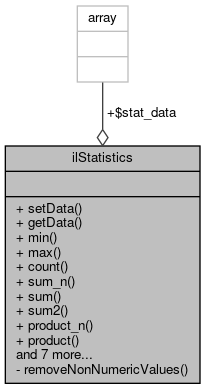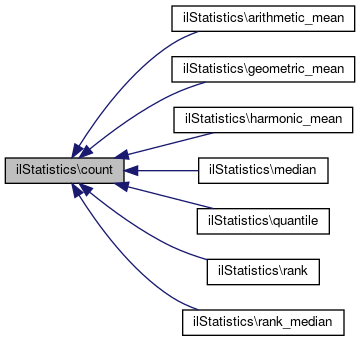Constants for the handling of elements which are not a number. More...
 Collaboration diagram for ilStatistics:
Collaboration diagram for ilStatistics:Public Member Functions | |
| setData (array $stat_data) | |
| getData () | |
| min () | |
| max () | |
| Calculates the maximum value. More... | |
| count () | |
| Calculates number of data values. More... | |
| sum_n (int $n) | |
| Calculates the sum of x_1^n + x_2^n + ... More... | |
| sum () | |
| Calculates the sum of x_1 + x_2 + ... More... | |
| sum2 () | |
| Calculates the sum of x_1^2 + x_2^2 + ... More... | |
| product_n (int $n) | |
| Calculates the product of x_1^n * x_2^n * ... More... | |
| product (int $n) | |
| Calculates the product of x_1 * x_2 * ... More... | |
| arithmetic_mean () | |
| Arithmetic mean of the data values xbar = (1/n)*∑x_i. More... | |
| geometric_mean () | |
| Geometric mean of the data values geometric_mean = (x_1 * x_2 * ... More... | |
| harmonic_mean () | |
| Harmonic mean of the data values harmonic_mean = n/(1/x_1 + 1/x_2 + ... More... | |
| median () | |
| Median of the data values. More... | |
| rank (float $value) | |
| Returns the rank of a given value. More... | |
| rank_median () | |
| Returns the rank of the median. More... | |
| quantile (float $n) | |
| n-Quantile of the data values More... | |
Data Fields | |
| array | $stat_data = [] |
Private Member Functions | |
| removeNonNumericValues () | |
Detailed Description
Constants for the handling of elements which are not a number.
This class provides mathematical functions for statistics. It works on an array of numeric values.
- Version
- $Id$
Definition at line 33 of file class.ilStatistics.php.
Member Function Documentation
◆ arithmetic_mean()
| ilStatistics::arithmetic_mean | ( | ) |
Arithmetic mean of the data values xbar = (1/n)*∑x_i.
Definition at line 142 of file class.ilStatistics.php.
References count(), and sum().
 Here is the call graph for this function:
Here is the call graph for this function:◆ count()
| ilStatistics::count | ( | ) |
Calculates number of data values.
Definition at line 72 of file class.ilStatistics.php.
Referenced by arithmetic_mean(), geometric_mean(), harmonic_mean(), median(), quantile(), rank(), and rank_median().
 Here is the caller graph for this function:
Here is the caller graph for this function:◆ geometric_mean()
| ilStatistics::geometric_mean | ( | ) |
Geometric mean of the data values geometric_mean = (x_1 * x_2 * ...
- x_n)^(1/n)
The geometric mean of a set of positive data is defined as the product of all the members of the set, raised to a power equal to the reciprocal of the number of members.
Definition at line 164 of file class.ilStatistics.php.
References count(), and product().
 Here is the call graph for this function:
Here is the call graph for this function:◆ getData()
| ilStatistics::getData | ( | ) |
◆ harmonic_mean()
| ilStatistics::harmonic_mean | ( | ) |
Harmonic mean of the data values harmonic_mean = n/(1/x_1 + 1/x_2 + ...
- 1/x_n)
Definition at line 181 of file class.ilStatistics.php.
References count(), and min().
 Here is the call graph for this function:
Here is the call graph for this function:◆ max()
| ilStatistics::max | ( | ) |
◆ median()
| ilStatistics::median | ( | ) |
Median of the data values.
Definition at line 201 of file class.ilStatistics.php.
References count().
 Here is the call graph for this function:
Here is the call graph for this function:◆ min()
| ilStatistics::min | ( | ) |
Definition at line 48 of file class.ilStatistics.php.
Referenced by harmonic_mean(), and product_n().
 Here is the caller graph for this function:
Here is the caller graph for this function:◆ product()
| ilStatistics::product | ( | int | $n | ) |
Calculates the product of x_1 * x_2 * ...
- x_i
Definition at line 133 of file class.ilStatistics.php.
References product_n().
Referenced by geometric_mean().
 Here is the call graph for this function:
Here is the call graph for this function: Here is the caller graph for this function:
Here is the caller graph for this function:◆ product_n()
| ilStatistics::product_n | ( | int | $n | ) |
Calculates the product of x_1^n * x_2^n * ...
- x_i^n
Definition at line 113 of file class.ilStatistics.php.
References min().
Referenced by product().
 Here is the call graph for this function:
Here is the call graph for this function: Here is the caller graph for this function:
Here is the caller graph for this function:◆ quantile()
| ilStatistics::quantile | ( | float | $n | ) |
n-Quantile of the data values
Definition at line 253 of file class.ilStatistics.php.
References count(), and ILIAS\Repository\int().
 Here is the call graph for this function:
Here is the call graph for this function:◆ rank()
| ilStatistics::rank | ( | float | $value | ) |
Returns the rank of a given value.
Definition at line 219 of file class.ilStatistics.php.
References count().
 Here is the call graph for this function:
Here is the call graph for this function:◆ rank_median()
| ilStatistics::rank_median | ( | ) |
Returns the rank of the median.
This method is different from the rank method because the median could be the arithmetic mean of the two middle values when the data size is even. In this case the median could a value which is not part of the data set.
Definition at line 236 of file class.ilStatistics.php.
References count().
 Here is the call graph for this function:
Here is the call graph for this function:◆ removeNonNumericValues()
|
private |
Definition at line 276 of file class.ilStatistics.php.
References ILIAS\LTI\ToolProvider\$key.
Referenced by setData().
 Here is the caller graph for this function:
Here is the caller graph for this function:◆ setData()
| ilStatistics::setData | ( | array | $stat_data | ) |
Definition at line 37 of file class.ilStatistics.php.
References removeNonNumericValues().
 Here is the call graph for this function:
Here is the call graph for this function:◆ sum()
| ilStatistics::sum | ( | ) |
Calculates the sum of x_1 + x_2 + ...
- x_i
Definition at line 96 of file class.ilStatistics.php.
References sum_n().
Referenced by arithmetic_mean().
 Here is the call graph for this function:
Here is the call graph for this function: Here is the caller graph for this function:
Here is the caller graph for this function:◆ sum2()
| ilStatistics::sum2 | ( | ) |
Calculates the sum of x_1^2 + x_2^2 + ...
- x_i^2
Definition at line 105 of file class.ilStatistics.php.
References sum_n().
 Here is the call graph for this function:
Here is the call graph for this function:◆ sum_n()
| ilStatistics::sum_n | ( | int | $n | ) |
Calculates the sum of x_1^n + x_2^n + ...
- x_i^n
Definition at line 80 of file class.ilStatistics.php.
Referenced by sum(), and sum2().
 Here is the caller graph for this function:
Here is the caller graph for this function:Field Documentation
◆ $stat_data
| array ilStatistics::$stat_data = [] |
Definition at line 35 of file class.ilStatistics.php.
Referenced by getData().
The documentation for this class was generated from the following file:
- Modules/Test/classes/class.ilStatistics.php




















